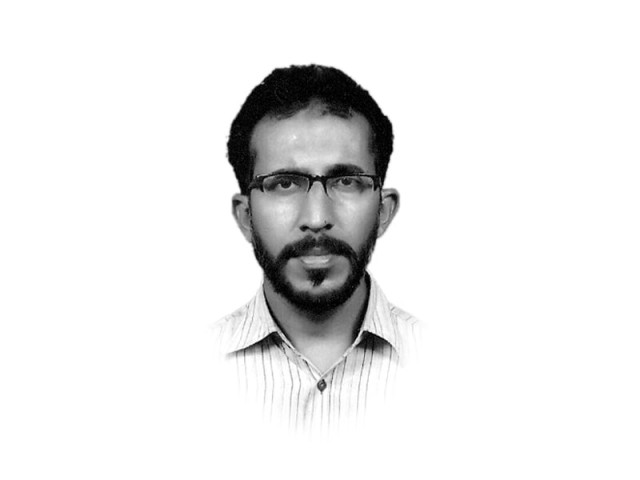Quality of literature counts, not language
But a good number of Pakistani writers particularly those writing fiction have now adopted this ‘imposed language’

The writer is member of staff
This is Tayari Jones — an African-American writer — who, during a panel discussion at the 36th edition of the Sharjah International Book Fair (SIBF), was telling the audience why she greatly admired an African author who refused to give up on his native language. Tayari’s words remind me of Haider Ali Aatish, who once said: Payaam Bar Na Mayassar Huwa To Khoob Huwa, Zaban-e-Ghair Say Kia Sharhe Aarzoo Kartay (It was all to the good that the messenger was unavailable, for how would I communicate my ardent desire [to my beloved] through someone else’s tongue.)
But a good number of Pakistani writers particularly those writing fiction have now adopted this ‘imposed language’, this ‘Zaban-e-Ghair’ — English — for self-expression. At the SIBF, which is one of the biggest cultural and literary events of the region, all the writers, who represented Pakistan, were writers of English. The emergence of this ever-growing group of English writers from Pakistan might be a positive thing if a matching number of writers were also taking up Urdu as their medium for expression. But this unfortunately is not the case.
Urdu has not received any good novel or short story collection from young people for quite some time. There has been some growth in Urdu fiction thanks to the works of ‘digest writers’, including Umera Ahmed, and I do regard their work as a contribution of sorts in the present situation; but our authors of high literature are a gradually shrinking league of grey-headed men. This is a very alarming sign both for Urdu and the Pakistani culture, primarily due to four reasons.
First, our creative talent is grappling with the difficulty of presenting a ‘local’ reality through a ‘foreign’ language. And while it is a fact that there is a whole new generation of authors for whom English is more like a mother tongue, our life here has certain shades and meanings that can only be expressed in a native language. Second, our creative talent is shifting to another language which, despite all the globalisation, is part of a separate culture; thus our writers are actually contributing to another culture.
Third, while our English writers have now an international audience, they have sort of alienated their own people — the local audience, which knows and speaks Urdu. This loss of contact is a loss both for the writer and the reader. Another problem related to the first issue is that writing for a global audience skews our style. We tend either to become over-explanatory or to skip intimate cultural details and allusions that might otherwise make our work richer.
Fourth, a language grows and enriches through work of its poets and writers. As Urdu is not receiving much new talent, it is shrinking in its modes of expressions. If the situation persists and no step is taken to stop and reverse this process, then Urdu might soon become a language incapable of expressing any complex idea or feeling. This would turn us into a cultural cesspool of raw thoughts, raw feelings and raw expressions and might also lead us to more chaos and more violence.
That is why I regard shifting of our creative talent to English as a cultural crisis. However, this crisis has not emerged all of a sudden and one could see it coming for a long time. In fact, the first people who ‘lost faith’ in all manifestations of our pre-British era culture, and by extension also in Urdu and its literature, were our first reformers — Sir Syed and Haali. Ironically, both of them were also founders of the new-era Urdu literature.
Particularly Sir Syed, after the fall of Delhi in 1857 to the forces of East India Company, had urged ‘his nation’ to shed its ‘outdated’ culture, including the Oriental languages, for the sake of ‘progress’. Apparently, this attitude of our national reformers later turned into our ‘national habit’ of looking down upon our own cultures and regarding them as symbols of ‘backwardness’ and ‘decadence’.
Needless to say, this behaviour stemmed from our long and devastating colonial experience of seeing a Gora Sahib wielding unimaginable power over a vernacular speaking population of defeated people. That Gora Sahib has already packed up and gone to his isle and a good 70 years have elapsed since, but unfortunately, we have still not woken up to the new realities.
I think Pakistanis must be among the world’s very few nations who tell you with a sense of pride that they are “really bad at Urdu.” For us, Urdu is the language that we generally want to get rid of and take ‘out of our system’ whenever we resolve to ‘progress’. However, it is about time we rejected this dangerous recipe for progress prescribed by our 19th-century reformers and started seeking progress through our culture. We must now re-educate ourselves to respect and celebrate our language, which still has lots of potential to dazzle the world.
Published in The Express Tribune, December 15th, 2017.
Like Opinion & Editorial on Facebook, follow @ETOpEd on Twitter to receive all updates on all our daily pieces.
















COMMENTS
Comments are moderated and generally will be posted if they are on-topic and not abusive.
For more information, please see our Comments FAQ